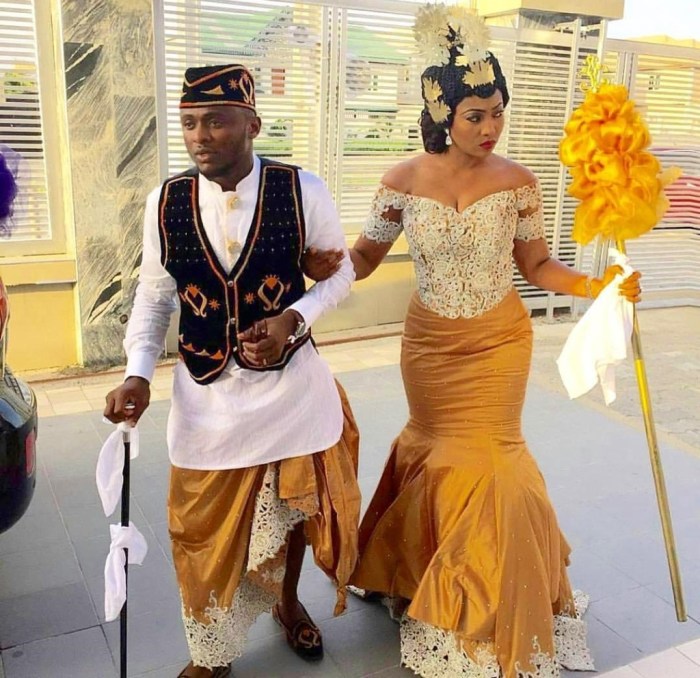Nigerian Wedding Dress Styles and Trends
African nigerian wedding dresses – Nigerian weddings are vibrant celebrations of love and culture, and the wedding dress plays a central role in these festivities. The styles and traditions surrounding these dresses are rich and diverse, reflecting the country’s numerous ethnic groups and the evolving influence of global fashion trends. This exploration delves into the evolution, symbolism, and modern interpretations of Nigerian wedding attire.
Evolution of Nigerian Wedding Dress Styles
Over the past decade, Nigerian wedding dress styles have undergone a significant transformation, blending traditional elements with contemporary designs. Initially, styles were heavily influenced by local fabrics and tailoring techniques, resulting in largely conservative silhouettes. However, the rise of social media and globalization has introduced bolder silhouettes, innovative embellishments, and a wider range of fabrics. The incorporation of international design elements, such as mermaid gowns and A-line dresses, is increasingly common, while still retaining the essence of Nigerian cultural aesthetics.
Traditional vs. Modern Nigerian Wedding Attire
Traditional Nigerian wedding attire often features elaborate embroidery, intricate beadwork, and richly colored fabrics specific to various ethnic groups. These dresses often reflect the bride’s heritage and family traditions. Modern interpretations maintain these cultural elements but incorporate more contemporary cuts, silhouettes, and embellishments. For example, a traditional aso ebi might be reimagined as a sleek, form-fitting gown with modern lace details, maintaining the cultural significance of the fabric while appealing to contemporary fashion sensibilities.
Influence of Nigerian Ethnic Groups on Wedding Dress Designs
Nigeria’s diverse ethnic groups significantly influence wedding dress designs. The Yoruba, Igbo, and Hausa ethnic groups, for instance, have distinct styles reflecting their unique cultural practices and traditions. Yoruba brides often opt for elaborate aso oke (woven cloth) ensembles, while Igbo brides may choose beautifully embellished attire with intricate patterns. Hausa brides frequently wear richly embroidered gowns, often in vibrant colors.
These differences highlight the rich tapestry of Nigerian culture and its impact on wedding attire.
| Fabric Name | Origin | Texture | Common Uses |
|---|---|---|---|
| Aso Oke | Yoruba | Stiff, Woven | Wraps, Gowns, Headwraps |
| George | Various | Smooth, Silky | Gowns, Jackets |
| Lace | International, Locally Produced | Delicate, Embroidered | Gowns, Veils |
| Ankara | West Africa | Cotton, Printed | Gowns, Accessories |
Color Palettes and Symbolism in Nigerian Weddings
Color plays a significant role in Nigerian weddings, carrying deep cultural and symbolic meaning. Specific colors are associated with prosperity, fertility, joy, and other auspicious qualities. The choice of color palette often reflects regional traditions and personal preferences.
Symbolic Meaning of Colors in Nigerian Weddings
In many Nigerian cultures, vibrant colors are favored. Red often symbolizes love and passion, while gold signifies wealth and prosperity. White represents purity and innocence, while green symbolizes growth and fertility. The use of these colors, and others, varies regionally and can be influenced by the bride’s personal beliefs and family traditions.
Popular Color Combinations in Different Regions of Nigeria
Color combinations vary across Nigeria. In the Yoruba region, rich jewel tones like deep purples, emerald greens, and golds are frequently seen. Igbo weddings might feature a blend of coral, gold, and ivory, while Hausa weddings often showcase vibrant combinations of blue, green, and red.
Three Distinct Color Palettes for Nigerian Wedding Dresses
Palette 1: Royal Blue, Gold, and Ivory – This palette conveys elegance and sophistication, symbolizing wealth and purity. Palette 2: Coral, Emerald Green, and Gold – This vibrant combination represents joy, fertility, and prosperity. Palette 3: Deep Purple, Maroon, and Gold – This regal combination reflects tradition and status, symbolizing power and opulence.
Cultural Significance of Specific Color Choices
A description of a vibrant coral and gold ensemble, symbolic of joy and prosperity in an Igbo wedding. Another description depicts a deep royal blue and gold gown, representing status and wealth in a Yoruba wedding. A final description illustrates a rich maroon and gold outfit, signifying tradition and respect within a Hausa wedding.
Accessories and Adornments in Nigerian Wedding Attire
Accessories and adornments significantly enhance the beauty and cultural significance of Nigerian wedding attire. These elements, often handcrafted, reflect the bride’s identity, family heritage, and the richness of Nigerian craftsmanship.
Key Accessories in Nigerian Wedding Dresses
Key accessories commonly worn with Nigerian wedding dresses include headwraps (gele), jewelry (necklaces, earrings, bracelets, rings), and footwear (traditional sandals or heels). These accessories not only enhance the aesthetic appeal but also hold significant cultural meaning, often passed down through generations.
Craftsmanship and Cultural Significance of Traditional Nigerian Jewelry
Traditional Nigerian jewelry is often handcrafted using materials like beads, precious metals, and stones. The intricate designs and techniques employed reflect the skill and artistry of Nigerian artisans. The jewelry often carries symbolic meaning, representing status, fertility, or protection. The use of specific materials and designs can vary significantly across different ethnic groups.
Popular Headwrap Styles at Nigerian Weddings
Gele, a traditional headwrap, is a prominent accessory in many Nigerian weddings. Various styles exist, with regional variations influencing the design and draping techniques. The Yoruba, Igbo, and Hausa cultures, for instance, each have distinct gele styles that are integral to their wedding traditions.
| Jewelry Type | Material | Significance | Regional Variation |
|---|---|---|---|
| Necklaces | Beads, Gold, Coral | Status, Fertility | Varying designs and materials across ethnic groups |
| Earrings | Gold, Silver, Beads | Adornment, Beauty | Shapes and styles reflect regional traditions |
| Bracelets | Gold, Silver, Beads | Protection, Adornment | Intricate designs vary across ethnic groups |
| Rings | Gold, Silver | Commitment, Marriage | Styles may vary slightly, but the significance remains consistent |
Modern Design Elements in Nigerian Wedding Dresses: African Nigerian Wedding Dresses
Modern Nigerian wedding dresses skillfully blend traditional elements with contemporary fashion trends. This fusion creates unique and stylish gowns that reflect both cultural heritage and modern aesthetics.
Influence of Contemporary Fashion Trends
Contemporary fashion trends, such as the use of specific fabrics, silhouettes, and embellishments, significantly influence the design of modern Nigerian wedding dresses. The incorporation of these trends keeps the designs current and fashionable while still respecting traditional elements.
Use of Lace, Embroidery, and Beading, African nigerian wedding dresses
Lace, embroidery, and beading remain popular embellishments in modern Nigerian wedding gowns. These techniques add texture, detail, and visual interest, enhancing the overall aesthetic appeal of the dress. The use of these techniques often reflects the bride’s personal style and the overall theme of the wedding.
Incorporation of Western Design Elements

Source: buzznigeria.com
Western design elements, such as A-line silhouettes, mermaid gowns, and ballgowns, are increasingly incorporated into traditional Nigerian wedding attire. This fusion creates a unique blend of cultures, resulting in contemporary and stylish gowns that still honor the bride’s heritage.
African Nigerian wedding dresses often showcase vibrant colors and intricate details, reflecting rich cultural heritage. A popular silhouette choice for brides, both in Nigeria and internationally, incorporates the elegance of a a line lace wedding dress , offering a sophisticated yet versatile option. This style beautifully complements the often bold and celebratory nature of many African Nigerian weddings, providing a classic yet adaptable foundation for individual expression.
Three Modern Nigerian Wedding Dress Designs
Design 1: A mermaid gown crafted from aso oke, featuring intricate beadwork along the bodice and a flowing train. Design 2: An A-line gown made from lace, incorporating traditional Nigerian embroidery patterns. Design 3: A ballgown in Ankara fabric, featuring a modern corset bodice and a voluminous skirt.
The Role of the Wedding Dress in Nigerian Wedding Ceremonies
The wedding dress in Nigerian ceremonies is more than just an outfit; it’s a powerful symbol of identity, family heritage, and cultural pride. The selection and wearing of the dress are often steeped in tradition and carry significant cultural weight.
The Wedding Dress Reflecting Identity and Heritage
The wedding dress reflects the bride’s identity and family heritage through the choice of fabric, design, and embellishments. Specific fabrics and patterns are often associated with particular ethnic groups or family lineages, making the dress a visual representation of the bride’s background.
Cultural Practices and Traditions Surrounding the Wedding Dress
The selection and wearing of the wedding dress are often surrounded by cultural practices and traditions. These may involve consultations with family elders, participation in traditional ceremonies, and the use of specific accessories or adornments. The process is often a significant part of the wedding preparations.
Significance of the Wedding Dress in Different Nigerian Ethnic Groups
The significance of the wedding dress varies among different Nigerian ethnic groups. For example, the aso oke worn by Yoruba brides holds significant cultural importance, representing family heritage and social status. Similarly, the elaborate beadwork and embellishments on Igbo wedding dresses reflect the rich cultural traditions of the Igbo people. Each ethnic group’s traditions shape the symbolism and significance of the wedding attire.
Preparation and Rituals Associated with the Wedding Dress
A description of the meticulous process of selecting and preparing the aso oke fabric for a Yoruba bride’s wedding gown, involving consultations with family elders and artisans. Another description details the intricate beadwork applied to an Igbo bride’s attire, a process that often involves family members and represents a collective effort. A final description focuses on the careful selection of embellishments and the symbolic meaning attached to the colors used in a Hausa bride’s gown.
Frequently Asked Questions
What is the average cost of a Nigerian wedding dress?
The cost varies greatly depending on the fabric, embellishments, and designer. Prices can range from a few hundred to several thousand dollars.
Where can I find a Nigerian wedding dress designer?
Many talented designers operate both within Nigeria and internationally. Online searches, bridal boutiques, and referrals can help you locate a suitable designer.
How long does it take to create a custom Nigerian wedding dress?
The timeframe depends on the complexity of the design and the designer’s workload. It’s best to allow several months for custom creations.
Can I rent a Nigerian wedding dress?
Renting is possible, but availability may be limited. Check with bridal boutiques specializing in Nigerian attire.




